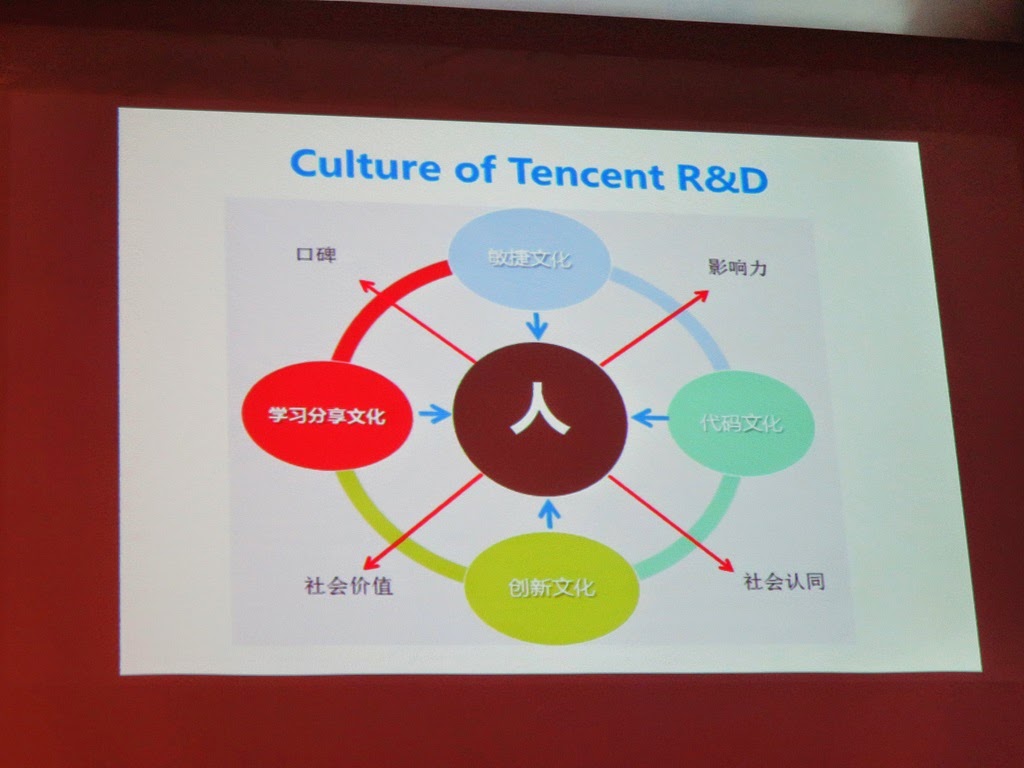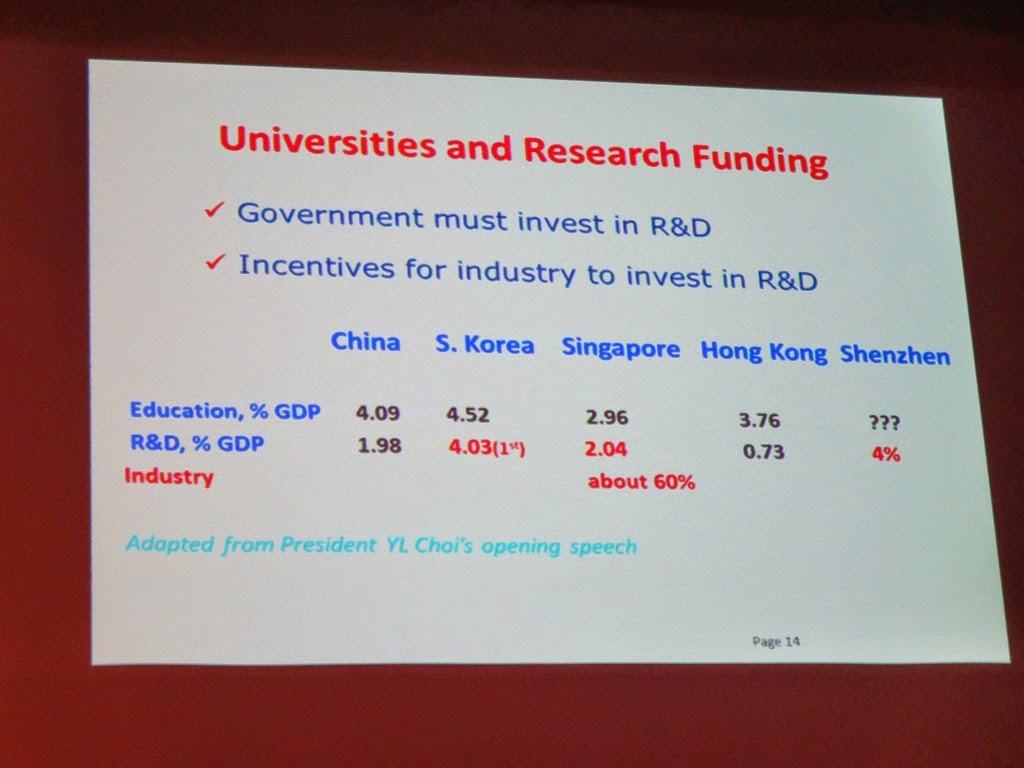The CAE-HKAES Joint Summit on Innovation and Technology Industry in Hong Kong and the Pearl River Delta (PRD) was held in Hong Kong on 13-14 April 2015 which was jointly organized by the Chinese Academy of Engineering (CAE) and the Hong Kong Academy of Engineering Sciences (HKAES), and was hosted by The Hong Kong Polytechnic University (PolyU). Morever, Hong Kong Applied Science and Technology Research Institute (ASTRI) and Hong Kong Science and Technology Parks (HKSTP) were supporting organizations, as well as, City University of Hong Kong (CityU) was one of sponsoring organizations. This two day summit provided a valuable platform for exploring directions for the future development of industry in Hong Kong and the PRD through technology and innovations arising from a combination of expertise and strengths from Hong Kong and the PRD. It aimed to explore future directions of HK-PRD collaboration on Innovation and Technology Industry development. The summit day 2 was summarized below.
Session 4: Factors for Commercial Success
Prof. CHENG Jing (Director, National Engineering Research Centre for Beijing Biochip Technology, China and Member, CAE) (Right) and Dr. CHAN Alex Siu Kun (Managing Director, Applied Technology Integration Ltd., HK and Fellow, HKAES) (Left) co-chaired this session.
The first speaker was Ms. WANG Ju Hong (VP, Tencent Technology (Shenzhen) Company Limited, China) and her presentation topic was “Grow with Innovation”. In the beginning, Ms. Wang briefed Tencent key milestones since 1998 such as QQ, Stock Exchange, WeChat, etc. Tencent was one of the leading internet companies and top 5 by market value (The ranking is Google, Facebook, Alibaba, Amazon and Tencent).
After that Ms. Wang introduced their Three-tiered Strategy included Core Platform, Investment & Partnership and “Open” Strategy.
Moreover, Tencent established the R&D Cultures included Innovation Culture, Agile Culture, Learning Sharing Culture and Code Culture. One of important activities in Innovation Culture was motivation such as monthly and annual awards.
The second speaker was Prof. PAHK Heui Jae (President and National Chief Technology Officer, Office of Strategic R&D Planning (OSP), Ministry of Trade, Industry and Energy, Korea) and his topic named “Innovative Ecosystem of Korea for Commercial Success”. Prof. Pahk said “Korea is the only country from aid-recipient to aid-donor”. He also mentioned from manufacturing to PSY that showed Dynamic Korea. Then he briefed the OSP which established in March 2010 and it was R&D Think-Tank for the Ministry of Trade Industry and Energy (MOTIE) that plan R&D Portfolio for the future economic growth.
Prof. Pahk emphasized Industry/Market Oriented R&D. So he used policy to change professors’ preference on publication in SCI/Nature to Market Oriented Research. He suggested to use Funding Policy for Market Oriented Research. He also quoted a poem in Chinese from朴喜載 “百聞不如一見,百見不如一行,百行不如一注。” explaining how “Lab to Global”. Moreover, he told us that they invested at least 10% of Revenue on R&D every year.
Dr. LEUNG Humphrey Kwong Wai (Group CEO, Solomon Systech Ltd.) was the third speaker and his presentation entitled “Building Strengths for Commercial Success in an IC Design Business”. He told us the traffic jam he met on this morning and used 1 hr for 2 km distance. He was inspired that the choice of right path in R&D was the most important!
Firstly, Dr. Leung explained IC Industry and its “Fabless” Business Model. Then he shared with us about Solomon Systech’s 5 Critical Aspects included “Innovation”, “International Partnership”, “Industry Talents”, “Institutionalization” and “Integrity”. He quoted Steve Jobs that “Innovation distinguishes between a leader and a follower”. He also added the one of key elements was to build Innovation Culture.
The last speaker was Prof. KO Ping Keung (President & CEO, Silicon Federation International Limited, HK) and his presentation was “Factors for Commercial Success (HK specific)”. He introduced his experience from Professor to Government community service and then became Full-time VC in China since 2001.
Prof. Ko identified HK-Shenzhen’s Golden Opportunity included infrastructure and people. Then he pointed out some factors for Commercial Success such as Technology customization to widen competitive edge (e.g. SoC chips). He emphasized no expectation from HK government. However, he expected some help such as increase non-local student populations in universities and relaxing immigration policy for talents.
Panel Discussion
Session 5: Recommendation for the Future (Panel Discussion)
Prof. TONG Timothy Wai Cheung (President,PolyU and VP, HKAES) (Left) and Prof. LEE Joseph Hun Wei (VP for Research and Graduate Studies, HKUST and Immediate Past President, HKAES) (Right) co-chaired this session. Each session chair would brief the summary of that session for sharing.
Summary of Session 1: Role of Government. Prof. Jin-Guang Teng (PolyU) presented session 1. He used Singapore’s Research and Innovation Strategies and its National Innovation System for comparison.
The following GDP on Education and R&D comparison was discussed and found that Hong Kong was still good investment on Education but very poor for R&D. Prof. Teng said we lost to Singapore in every case of attracting major MNCs (e.g. Incentive for MNCs & new startups, Tax incentive, flexibility in government policies and freedom for R&D activities). The only way to breakthrough is collaboration with Shenzhen and PRD.
Summary of Session 2: Research and Development. Prof. Victor OK LI said all speakers explored the difficulty of translating research results into innovations and technology developments because of insufficient research funding, lack of incentives for academics, mismatching between academic output and industry need, and lack of ecosystem.
Summary of Session 3: Knowledge Transfer / Exchange. Prof. WS Wong summarized speaker presentation and panel discussion such as Technology transfer strategy – Fundamental platform technologies, specific and customization. Some questions were discussed such as how to encourage closer collaboration between Hong Kong and PRD, as well as, how to increase private R&D spending.
Summary of Session 4: Factors for Commercial Success. Dr. CHAN Alex Siu Kun summarized this morning topic content into four key elements to be commercial success. They were Ecosystem, Innovation Culture, Market & Timing, as well as, Management & Change.
During the last Panel Discussion, Prof. KUO Way (President, CityU) commented to predict the future was very difficult. He also said HK government needed to take risk. It was related to leadership that China and Singapore had done it well. (Details at CityU President speaks at innovation summit)
Dr. Liao pointed out our housing problem that may not be attracting talent to service in Hong Kong (Quality of Life).
Prof. Gan said Key Universities in Beijing and Guangzhou had important roles for economy growth but Hong Kong’s universities had not utilized efficiency.
Prof. LIN Otto Chui Chau (Senior Advisor, PolyU and Fellow, HKAES) shared his idea on Social Economic Development from Agricultural to Industrial and finally to Knowledge Based Economy.
He analyzed Hong Kong Innovation System through the interaction among University (U), Government (G), Technology (T) and Business (B). So he suggested to reform HK’s Innovation System included Resolution, Culture and Strategy.
At the end of the Summit, Prof. CHOI Yu Leuk (President, HKAES) gave a concluding address. He said the purpose for HKAES is to facilitate formulation of Hong Kong’s Innovation and Technology Policy. He raised the versatility of Hong Kong System that resources allocation system to be market led incorporating interaction with Territorial Development Strategy (TDS). Some recommendations from HKAES were briefed such as to formulate strategies to promote innovation and technology as an engine of economic growth and social well-being, and to develop policies and mechanisms to facilitate effective integration of HK and the PRD in science and technology, innovation and entrepreneurship.
In the summit lunch, I met Mr. MY Wong (Chairman, Board of Directors, ASTRI) and took a photo for memory.
Reference:
Chinese Academy of Engineering (CAE) - http://en.cae.cn/en/
Hong Kong Academy of Engineering Sciences (HKAES) - http://www.hkaes.org/
Prof. LIN Otto Chui Chau (Senior Advisor, PolyU and Fellow, HKAES) shared his idea on Social Economic Development from Agricultural to Industrial and finally to Knowledge Based Economy.
He analyzed Hong Kong Innovation System through the interaction among University (U), Government (G), Technology (T) and Business (B). So he suggested to reform HK’s Innovation System included Resolution, Culture and Strategy.
At the end of the Summit, Prof. CHOI Yu Leuk (President, HKAES) gave a concluding address. He said the purpose for HKAES is to facilitate formulation of Hong Kong’s Innovation and Technology Policy. He raised the versatility of Hong Kong System that resources allocation system to be market led incorporating interaction with Territorial Development Strategy (TDS). Some recommendations from HKAES were briefed such as to formulate strategies to promote innovation and technology as an engine of economic growth and social well-being, and to develop policies and mechanisms to facilitate effective integration of HK and the PRD in science and technology, innovation and entrepreneurship.
In the summit lunch, I met Mr. MY Wong (Chairman, Board of Directors, ASTRI) and took a photo for memory.
Reference:
Chinese Academy of Engineering (CAE) - http://en.cae.cn/en/
Hong Kong Academy of Engineering Sciences (HKAES) - http://www.hkaes.org/























沒有留言:
發佈留言